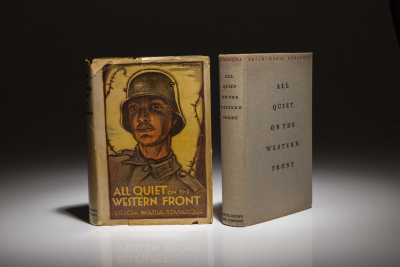
Erich Maria Remarque's ‘All Quiet on the Western Front’ stands tall as a paramount piece of anti-war literature, capturing the harrowing tale of a generation vanquished by World War 1. The first-ever non English adaptation of this literary masterpiece is honoured with nine Academy Award nominations this year. Let us revisit this classic and see what makes it relevant today.
About the author
Erich Maria Remarque was born in Osnabruck, Germany, in 1898 into a lower-middle-class family. As a young man of 18, he was pursuing higher education at the University of Munster when fate intervened and drafted him (along with a number of his classmates) into the German army. Amidst the turmoil of war, he discovered his passion for storytelling and began writing fiction.
After six months of military training, his unit was sent to the Western Front. The horrors of World War (1914-1918) cast a long shadow on Remarque's writing, shaping him into the author he would become. He found himself thrust into the trenches of Flanders. Belgium and experienced the brutal reality of trench warfare firsthand. In 1917, he was injured by the fierce barrage of British artillery, and a year later was sent back to the front lines, post-recovery. It was during his recovery that Remarque thought of writing a novel about the war. He gathered material for his book from personal stories sent by his friends from the battlefield and also interviewed wounded soldiers, to come up with authentic scenes for his story. Shortly thereafter a revolution led to the overthrow of Germany's imperial government and the establishment of a republic. On November 11, 1918, the newly- formed government signed a formal agreement with the Allies, effectively bringing an end to the fighting. These wartime events, coupled with the loss of some of his comrades, left a profound impact on Remarque, inspiring him to pen his most influential novel, ‘Im Westen Nichts Neues’. Published in Germany in 1929, Remarque's literary masterpiece sold over 1.2 million copies within a year, solidifying his place as one of Germany's most celebrated writers. The English translation of this novel, ‘All Quiet on the Western Front’ was published in the same year and garnered similar success. It went on to be translated into more than 20 languages and was made into a celebrated Hollywood film in 1930.
What makes it a classic?
The horrors of war
The novel describes the physical and emotional toll that war tikes on soldiers, and highlights the senseless violence and destruction that war creates. It is the author’s attempt to highlight and document how despite dodging death in the trenches and making it back home, a soldier’s soul is irreversibly crushed by what he witnessed at the war front.
Today, as conflicts (like the Russian invasion of Ukraine) continue to occur around the world the novel serves as a reminder of the human cost of war and the need for peaceful solutions to conflicts.
Dehumanisation of soldiers
The soldiers in the novel are forced to abandon their individuality and become part of a machine-like military system. This is still relevant today, as soldiers continue to face the challenge of maintaining their own identity in the face of military discipline. One of the most striking aspects of the novel is the way it depicts the soldiers as being treated as expendable objects, rather than human beings with lives, families, and aspirations.
They are constantly reminded of their duty to the state and the importance of sacrifice. The book describes how the trauma and the unspeakable acts of violence soldiers witness on the battlefield transform them into brute tools of war, devoid of humanity.
Disillusionment
The novel also explores the theme of disillusionment. As the war drags on, Paul and his comrades become increasingly disillusioned with the ideals of patriotism and duty that drove them to enlist in the first place. They realise that they have been fed lies and propaganda to justify a war that has only brought them suffering and death. The novel also portrays the difficulty of these soldiers in returning to civilian life after the war, as Paul struggles to reconnect with a society that does not understand or appreciate the sacrifices he and his fellow soldiers made.
In this way, this German classic highlights the devastating effects of war on both the individual and society as a whole and serves as a powerful critique of the glorification of war and how it is justified as nationalism.
Picture Credit : Google




